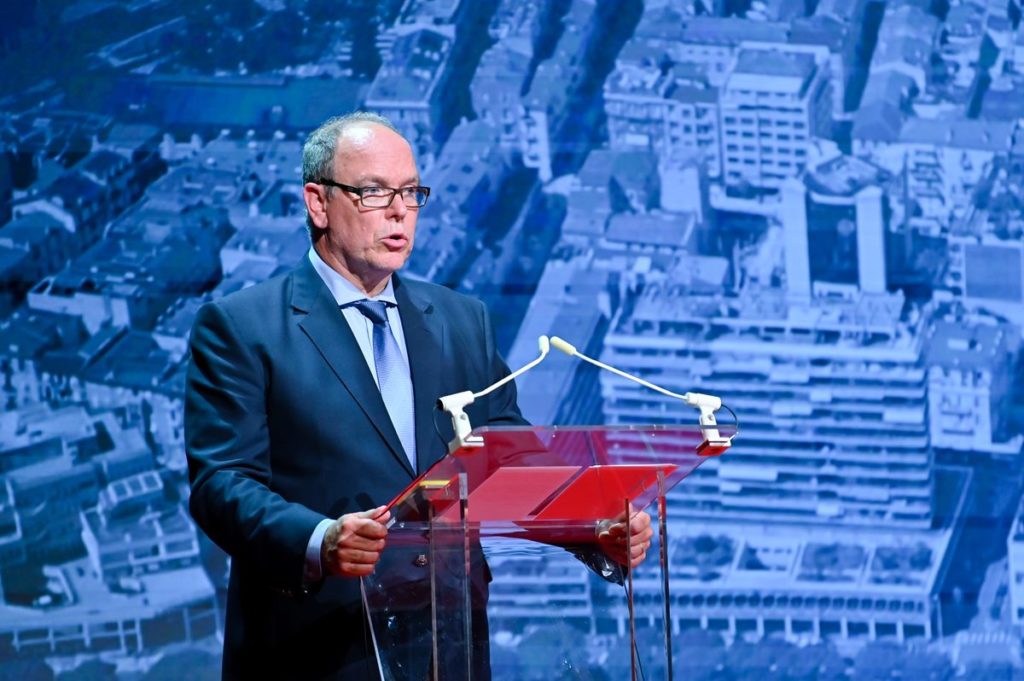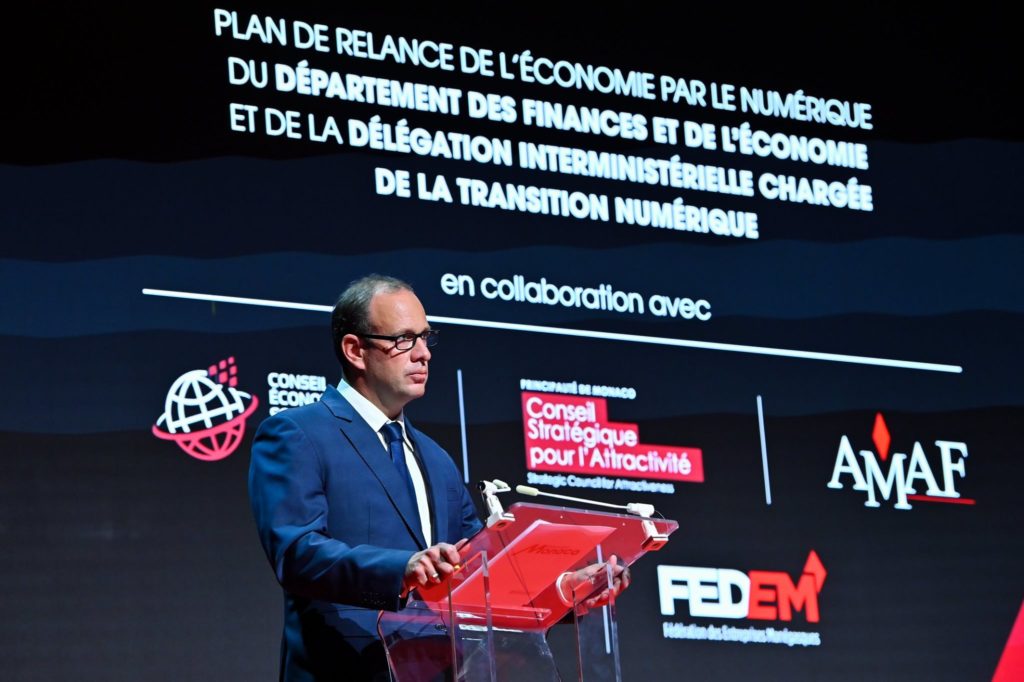
“The lockdown period clearly demonstrated the all-encompassing power of digital technology. This transformation is inevitable, and failing to push our economy to make this shift would present a major risk of falling behind.” This point, raised by both Minister of Finance and Economy Jean Castellini and Country Chief Digital Officer Frédéric Genta, has guided the Monegasque Government’s strategy on boosting the national economy following the COVID-19 health crisis. Jointly developed by the Ministry of Finance and Economy and the Digital Transition Office, and unveiled on 9 September, the recovery plan for Monaco’s economy aims to take advantage of the potential offered by digital technology to emerge from the crisis. It is based on three pillars: supporting the digital transformation of Monegasque businesses, building a digital ecosystem for Monaco that meets leading standards, and creating a digital economy in the Principality.
Catching up
“During the COVID-19 crisis, the importance of digital technology for our economy was clear to everyone. And everyone is aware that we must catch up in this area, where we have fallen behind due to a lack of digital maturity within Monegasque businesses, an underdeveloped digital ecosystem in Monaco in terms of platforms, and an economy that, overall, is focused on sectors that depend on physical flows (real estate, tourism and so on),” explains Diego Bonaventura, who heads the Digital Economy Unit within the Digital Transition Office.
The challenge for the private sector is significant. “The economic impact of digital is real: on average, businesses which embark on a digital transition increase turnover by 10% and margins by 25%.”* It’s very simple: 95% of OECD countries are focusing on digital as a priority for growth and recovery. In Ireland, for example, businesses are being offered €2,500 to provide digital training for their employees. Meanwhile, France recently announced that €7 billion of its recovery plan will be devoted to digital technology, and has developed a digital investment loan programme for businesses and training cheques for small and medium-sized enterprises.
Supporting the digital transformation of businesses
One of the flagship measures in Monaco’s recovery plan is the creation of a digital fund to accelerate the transformation of the economy. Known as the “Blue Fund”, it will provide financing for:
- Training, equipment and support for Monegasque businesses;
- The development of local e-commerce, restaurant booking, payment and similar platforms;
- The creation of services on the Sovereign Cloud, such as effective, secure videoconferencing.
“Inspired by the Green Fund model, this fund will initially total €20 million. It will become active in January 2021 and continue to operate for at least the next three years, because this is a long-term commitment. We want to give ourselves the means to effect radical change, this is not a ‘one shot’ approach,” says Frédéric Genta. “The Blue Fund is a strategic tool. A key element in a virtuous circle that is helping to accelerate the digital transformation of local businesses,” adds Diego Bonaventura.
 Transforming Monaco’s traditional economy requires developing a comprehensive set of measures aimed at the private sector. A range of services will be offered through a centralised platform. This single point of entry for entrepreneurs, launched in autumn 2020, has several objectives:
Transforming Monaco’s traditional economy requires developing a comprehensive set of measures aimed at the private sector. A range of services will be offered through a centralised platform. This single point of entry for entrepreneurs, launched in autumn 2020, has several objectives:
– To enable businesses to test their digital maturity using a self-diagnostic questionnaire. “To work out where you want to go, you need to know where you’re starting from,” notes Diego Bonaventura.
– To provide free access to a library of content designed to provide an introduction to digital technology and the issues it raises (search engine optimisation, data risk management, etc.). Training and awareness sessions will be delivered by the major digital players (Google, Amazon, etc.). Webinars and workshops on key topics (ensuring you are listed by search engines, creating content for social media) will supplement the offering. “Our aim is to convince people of the value of digital technology and to support businesses from start to end,” emphasises Diego Bonaventura.
– To provide a directory of digital experts in Monaco who can assist entrepreneurs as they engage in this transformation.
– To offer information on dedicated financial support.
Building an effective digital ecosystem in Monaco
Another priority for Monaco is to quickly build an ecosystem that meets leading international standards. This will be achieved through the creation of high-performing infrastructure that will enable entrepreneurs to increase productivity:
- The launch in 2021 of Monaco Cloud, the Monegasque sovereign cloud featuring the latest digital tools and applications. Based on sector-leading Amazon Web Services (AWS) technology, this secure sovereign cloud will allow data to be stored in the Principality, subject to Monegasque law and with a level of security validated and monitored by the Monaco Cyber Security Agency.
- The launch of fibre in December 2020 and 5G terminals (iPhone, etc.) in late 2020 for outstanding connectivity.
- Access to international platforms through partnerships with global leaders (Deliveroo, Netflix, etc.) and the removal of legal obstacles for the major payment platforms (PayPal, Stripe).
- The introduction of electronic signatures and a stamp distributed by the Business Development Agency from this month (September) in accordance with the legislation on digital technology adopted in late 2019. Archiving and the digital safe in 2021.
Creating a digital economy in the Principality
What is being designed in Monaco is a true digital economy, a driver of growth that is transforming many economic sectors (trade, insurance, health care, etc.) and at the same time changing economic and organisational models.
The State is keen to act as a facilitator to accelerate the process:
- By launching the Security Token Offering (STO) platform: a mechanism for raising funds through blockchain. In partnership with Euronext, the main stock exchange for the euro zone, the platform aims to attract new businesses, particularly digital businesses, to Monaco, creating some 100 jobs in the country each year and injecting €150 million into the Monegasque economy.
- By actively contributing to the establishment of local platforms (Carlo, incubated by Monaco Tech, Mr. Room Service, etc.).
- By promoting the development of Monegasquedigital service companies, setting aside for them a significant share of the market for supporting the digital transformation of Monegasque businesses in receipt of State support, or the market for implementing the services offered by the sovereign cloud.
- By creating digital segments within the sectors in which Monaco traditionally excels, such as real estate. For example, Monaco is banking on the development of real estate tech, alongside reputable partners such the ESCP Business School in Paris.
* Source: MIT


 Transforming Monaco’s traditional economy requires developing a comprehensive set of measures aimed at the private sector. A range of services will be offered through a centralised platform. This single point of entry for entrepreneurs, launched in autumn 2020, has several objectives:
Transforming Monaco’s traditional economy requires developing a comprehensive set of measures aimed at the private sector. A range of services will be offered through a centralised platform. This single point of entry for entrepreneurs, launched in autumn 2020, has several objectives: